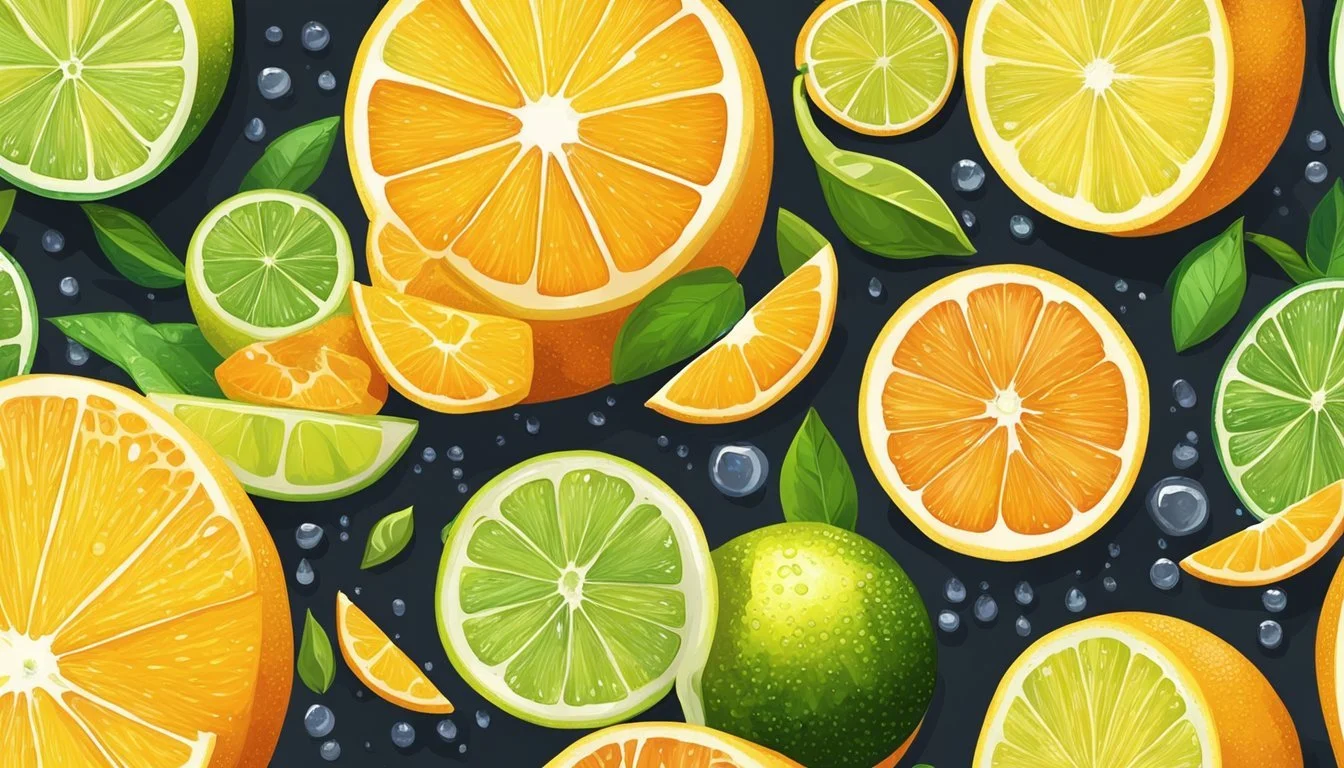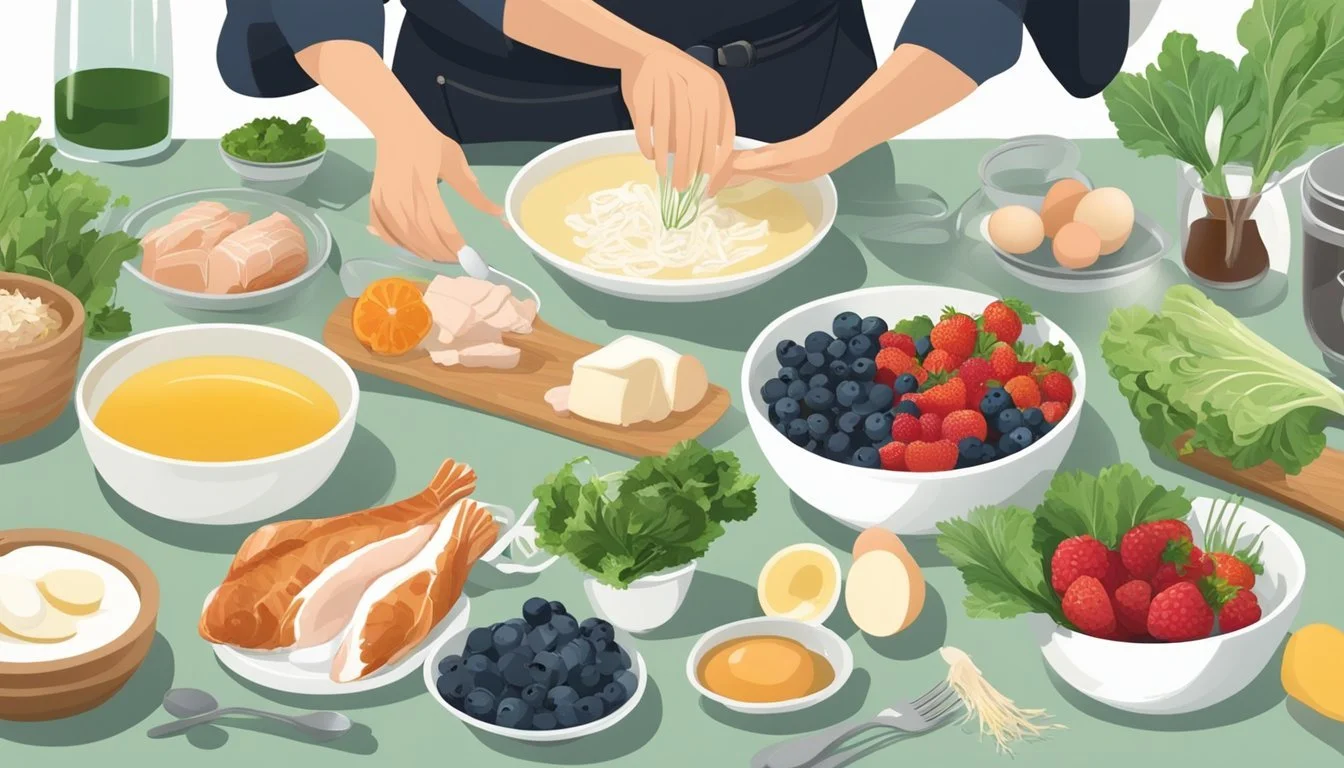8 Collagen-Rich Foods to Support Skin Health and Joint Function
Boost Your Skin and Joint Health
Collagen plays a crucial role in maintaining the strength and elasticity of the skin, joints, and bones. Understanding how diet can impact collagen production is essential for those looking to support their body's natural processes.
What foods are high in collagen and how can they benefit your health? This article will explore various foods that are rich in collagen or promote its synthesis, offering practical dietary choices to enhance your overall well-being.
1) Bone Broth
Bone broth has gained popularity for its collagen-rich properties. This nutrient-packed broth is made by simmering animal bones and connective tissue in water for an extended period. This process extracts essential minerals, amino acids, and collagen from the bones, resulting in a highly nutritious liquid.
Consuming bone broth can provide your body with collagen, which plays a crucial role in maintaining skin elasticity, joint health, and bone strength. Though some skepticism exists about the body's ability to absorb collagen directly from food, bone broth remains a favored choice for those seeking to boost their collagen intake.
Prepared in large pots or slow cookers, bone broth requires minimal ingredients: animal bones, water, and optional seasonings. The long cooking process, usually between 12 to 24 hours, ensures maximum nutrient extraction. Many enthusiasts prefer adding vegetables and herbs to enhance flavor and nutritional value.
Bone broth is often enjoyed as a warm, savory drink or used as a base for soups and stews. Its versatility and health benefits make it a staple in diets focused on collagen support.
2) Chicken Skin
Chicken skin is a notable source of collagen. When consumed, it can contribute to the body’s natural collagen production. Collagen from chicken skin can support skin health, promoting elasticity and reducing the appearance of fine lines.
Eating chicken skin can also provide other nutrients that aid collagen synthesis. These include amino acids like glycine and proline. Both are essential components of collagen production.
For those incorporating chicken skin into their diet, it is recommended to choose high-quality, free-range chicken. This ensures the skin is free from added hormones or antibiotics.
To maximize the benefits, consider consuming chicken skin in moderation as part of a balanced diet. Cooking methods such as roasting or grilling are preferable to deep-frying to maintain nutritional value.
3) Fish Scales
Fish scales are a noteworthy source of collagen, offering a unique alternative to traditional animal-derived collagen. The collagen from fish scales is often considered safer due to the minimal risk of zoonotic infections and fewer religious restrictions.
The extraction of collagen from fish scales involves acid hydrolysis, a process that breaks down the scales to release the collagen. Fish scales contain abundant amounts of collagen protein, which is packed firmly within calcium hydroxyapatite crystals.
Compared to other sources like fish bones or skin, fish scales provide a more consistent yield of collagen. This makes them a viable option for nutraceuticals aimed at addressing undernutrition. Importantly, utilizing fish scales helps reduce environmental waste, converting this by-product into valuable nutritional supplements.
The collagen derived from fish scales not only serves as a protein source but also contains functional compounds and peptides. These components can offer antioxidant and anti-inflammatory benefits, adding to the overall value of this collagen source.
Fish scales are increasingly recognized for their potential in various applications, from medical to cosmetic. Their high collagen content and compatibility with human use make them an important resource in the food and health industries.
4) Egg Whites
Egg whites are an excellent source of proline, an amino acid critical for collagen production. Proline plays a key role in stimulating the body's natural ability to produce collagen, which is essential for maintaining healthy skin, joints, and connective tissues.
Unlike whole eggs, egg whites contain no connective tissues, but their high proline content makes them valuable in promoting collagen synthesis. Including egg whites in your diet can help support collagen levels, contributing to skin elasticity and overall vitality.
Egg whites can be easily incorporated into various dishes. They can be used in omelets, as a protein boost in smoothies, or as a binding agent in baking. Their versatility and health benefits make egg whites a simple addition to a collagen-boosting diet.
5) Citrus Fruits
Citrus fruits, including oranges, lemons, grapefruits, and limes, are rich in vitamin C. This essential nutrient plays a crucial role in collagen synthesis. While citrus fruits do not contain collagen themselves, the high vitamin C content assists the body in producing collagen naturally.
Vitamin C is a co-factor for enzymes that stabilize and cross-link collagen molecules. This supports skin elasticity and strength. Including citrus fruits in the diet is an effective way to enhance collagen production.
Oranges, specifically, are a popular source of vitamin C and make for a convenient snack. Squeezing fresh lemon or lime juice over salads or into water can also boost vitamin C intake.
Grapefruits provide a tangy option, packed with antioxidants that support overall skin health. Regular consumption of these fruits can contribute to maintaining firm and vibrant skin.
6) Berries
Berries are an excellent source of vitamin C, which is essential for collagen production. Strawberries, in particular, pack a high vitamin C content, helping the body synthesize collagen more effectively.
Blueberries and blackberries also contribute to collagen formation. These berries contain antioxidants that protect the skin from damage, further supporting collagen maintenance.
Raspberries and cranberries should not be overlooked. They are rich in nutrients that promote overall skin health. Including a variety of berries in the diet can provide the necessary nutrients to stimulate and protect collagen in the body.
7) Garlic
Garlic, a common kitchen staple, is often recognized for its potent health benefits. Beyond its flavor-enhancing properties, garlic can play a role in supporting collagen production in the body.
Garlic contains sulfur, a trace mineral that helps synthesize and prevent the breakdown of collagen. This makes it an essential component for maintaining skin health and elasticity.
Additionally, garlic offers a small amount of taurine and lipoid acid, both of which help rebuild damaged collagen fibers. Including garlic in meals can contribute to the integrity of connective tissues.
Regular consumption of garlic not only adds depth to dishes but also ensures an intake of nutrients vital for overall skin health. Its antioxidative properties further support the maintenance of healthy collagen levels.
Incorporating garlic into one's diet can be simple and versatile. Whether minced in sauces, roasted with vegetables, or added to dressings, garlic remains a readily available ingredient that supports the body's natural collagen production.
8) Leafy Greens
Leafy greens are prominent in the roster of foods that can enhance collagen production. Vegetables such as spinach, kale, and Swiss chard provide essential nutrients that support the body's natural collagen synthesis.
Chlorophyll, the pigment responsible for the green color in these vegetables, is known to boost type I collagen production. This type of collagen can help reduce the appearance of wrinkles and skin aging.
Leafy greens also contain significant amounts of vitamin C. This vitamin is a vital co-factor in collagen synthesis, aiding in the stabilization and formation of collagen fibers. Including a variety of leafy greens in the diet can offer multiple benefits for skin health and elasticity.
9) Bell Peppers
Bell peppers are an excellent source of vitamin C, which is essential for collagen synthesis. Both red and green bell peppers can boost the body's collagen production due to their high vitamin C content.
Red bell peppers, in particular, contain more vitamin C than their green counterparts, making them especially beneficial. This nutrient plays a critical role in forming and maintaining collagen in various tissues.
Additionally, bell peppers are rich in antioxidants. These compounds help protect the skin and other tissues from damage, supporting the overall effectiveness of collagen within the body.
Eating a variety of bell peppers can contribute significantly to your daily intake of vitamin C, promoting healthier skin and joints. Integrating bell peppers into your diet can be as simple as adding them to salads, stir-fries, or even consuming them raw as a snack.
Thanks to their versatility and nutritional benefits, bell peppers are a valuable addition to any diet aimed at enhancing collagen production. Whether cooked or raw, these vibrant vegetables can help support collagen health.
10) Tomatoes
Tomatoes are a versatile and nutritious addition to a diet focused on collagen production. They are rich in vitamin C, an essential nutrient for synthesizing collagen in the body.
Moreover, tomatoes contain antioxidants like lycopene. These antioxidants help protect the skin from damage caused by free radicals, thus supporting collagen integrity.
Incorporating tomatoes into meals is easy. They can be added to salads, sauces, or eaten raw. Their natural sweetness and acidity enhance a variety of dishes while benefiting skin health.
Tomatoes also offer hydration due to their high water content. Keeping the skin hydrated aids in maintaining elasticity and a youthful appearance. This contributes further to the benefits of collagen.
Regular consumption of tomatoes can therefore support overall skin health by providing key nutrients necessary for collagen production.
What is Collagen?
Collagen is a vital protein in the body, crucial for maintaining the structure and strength of various tissues. This section will explain the role of collagen and the different types that exist.
Role of Collagen in the Body
Collagen is the most abundant protein in the human body. It forms the primary structure of connective tissues like skin, tendons, ligaments, and bones.
This protein provides strength and elasticity to these tissues. In the skin, collagen contributes to its firmness and elasticity, helping to reduce wrinkles and maintain a youthful appearance.
In bones and joints, collagen aids in maintaining their integrity and function. It also supports the structure of muscles, blood vessels, and even parts of the digestive system.
Types of Collagen
There are at least 28 types of collagen, each serving unique purposes. The most common ones are:
Type I: Found in skin, bones, tendons, and organs. It provides tensile strength and elasticity.
Type II: Present in cartilage, essential for joint function and structure.
Type III: Found in the skin, muscles, and blood vessels. It aids in tissue and organ development.
Type IV: Located in the basal lamina, a part of the basement membrane. It supports various cellular activities.
Understanding these types helps in choosing the right foods and supplements to support specific health needs.
Benefits of Consuming Foods High in Collagen
Foods high in collagen offer numerous health benefits. Notably, they support skin health, enhance joint and bone strength, and improve gut health.
Skin Health and Anti-Aging
Collagen is a protein that promotes skin elasticity and hydration. As people age, their collagen production decreases, leading to wrinkles and dryness.
Consuming collagen-rich foods, such as beef bone broth and citrus fruits, helps replenish collagen levels. This can lead to firmer, more youthful-looking skin.
Vitamin C-rich fruits like oranges and kiwi also play a crucial role in promoting natural collagen synthesis, enhancing the skin's suppleness.
Including these foods in one's diet can significantly reduce the appearance of fine lines and improve overall skin texture.
Joint and Bone Health
Collagen is a vital component of cartilage, which cushions joints and maintains bone integrity. Foods such as bone broth and fish are rich in collagen and can help maintain joint flexibility and reduce inflammation.
Regularly consuming collagen can alleviate joint pain associated with aging and conditions like osteoarthritis.
High-protein foods that are sources of glycine and proline, such as poultry and fish, further support cartilage repair and bone strength.
This can lead to improved mobility and a lower risk of injuries and joint-related issues.
Gut Health
Collagen supports the integrity of the gut lining. It contains amino acids like glutamine, which can help heal the intestinal wall.
Foods like aloe vera and berries, high in collagen-boosting nutrients, enhance digestive health. They can help prevent conditions like leaky gut syndrome by promoting a healthy gut barrier.
Maintaining a strong gut lining is essential for nutrient absorption and overall digestive efficiency.
Consuming collagen-rich foods can therefore lead to better digestion and fewer gastrointestinal problems.
By incorporating these foods into their diet, individuals can support their gut health and improve their overall digestive well-being.
How to Incorporate Collagen-Rich Foods into Your Diet
Incorporating collagen-rich foods into your diet can boost skin health, improve joint function, and support overall wellness through simple meal planning and easy recipes. Key ingredients to include are beef bone broth, citrus fruits, and dark leafy greens.
Meal Planning Tips
Planning meals with collagen-rich foods ensures consistent intake. Start by integrating beef bone broth into soups or stews. Swap regular snacks for vitamin C-rich fruits like oranges, kiwis, and guavas. Use sweet potatoes as a vitamin C-packed side dish.
Add avocados to salads or as a topping for toast to boost omega-3 intake. Incorporate fish like salmon or trout, which are rich in both collagen and omega-3 fatty acids, into your weekly menu.
Simple Recipes
Bone Broth Soup: Simmer beef bone broth with vegetables and spices for a nourishing soup.
Fruit Salad: Combine citrus fruits, kiwi, pineapple, and guava, drizzle with honey.
Sweet Potato Mash: Boil sweet potatoes, mash with olive oil and a pinch of salt.
Avocado Toast: Spread mashed avocado on whole-grain toast, top with a sprinkle of salt and pepper.
Salmon Salad: Mix grilled salmon with dark leafy greens, cherry tomatoes, and a light vinaigrette.











